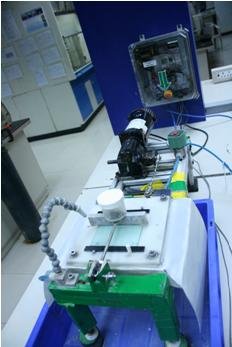Jun 17 2010
SABIC Innovative Plastics today announced new scratch and abrasion evaluation capabilities - including new methods and processes - to differentiate, measure, test and prevent surface damage to polycarbonate (PC) glazing for high-performance automotive glazing applications.
The announcement underscores SABIC Innovative Plastics’ R&D excellence and illustrates how the company’s Exatec* glazing technology and analytical tools are helping automotive manufacturers succeed by better understanding and addressing the long-term implications of day-to-day vehicle use. The addition of these new industry-leading testing and assessment capabilities are a testament to SABIC Innovative Plastics’ commitment to the global automotive industry to deliver lightweight glazing solutions with superb performance, durability and aesthetics for a clear competitive advantage.
 Lab Scale Wiper Abrasion Test Equipment, Part of Exatec’s Scratch and Abrasion Evaluation Capabilities
Lab Scale Wiper Abrasion Test Equipment, Part of Exatec’s Scratch and Abrasion Evaluation Capabilities
“SABIC Innovative Plastics is completely dedicated to developing the performance of PC glazing to reduce environmental impact, enhance styling and aerodynamics, and reduce weight for greatly enhanced fuel efficiency,” said Stephen Shuler, Exatec’s chief technology officer. “But to take the power of PC to even greater heights, glazing must be able to deliver long-term abrasion and scratch resistance. Our new R&D capabilities, combined with our extensive Exatec glaze testing and evaluation services and our continued investments in innovation, will help ensure we lead the glazing curve and help our customers move forward with the best technologies on the market today.”
New R&D Capabilities Measures Surface Quality
Using state-of-the-art instruments for testing and analysis, SABIC Innovative Plastics’ dedicated team of engineers and polymer scientists at Exatec evaluate the effects of surface wear on PC glazing using either wet coat or both wet coat and plasma coating technologies. Other testing capabilities include taber abrasion equipment, nano-indentation, optical imaging, surface profilometry, full-scale wiper test stands, and a lab-scale wiper test stand specially instrumented to control speed and pressure as well as test different blade types and debris conditions.
Exatec also conducts long-term road evaluations on its own test vehicles to obtain critical data on the effects of weathering, weekly car washes and rear wiper performance on glazing. By quantifying some of the mechanisms that cause scratches and abrasion, and correlating them to fleet vehicle data and customer experiences, the Exatec team continues to address the needs of its automotive customers.
“We were one of the first to develop PC glazing solutions for automotive manufacturers more than a decade ago, and our innovations, such as our advanced plasma coating technology, continue to lead the industry,” Shuler added. “Our new scratch and abrasion evaluation capabilities are yet another example of our commitment to this critically important industry through more advanced analysis and optimization of PC glazing solutions that meet the specific requirements of global automotive manufacturers.”